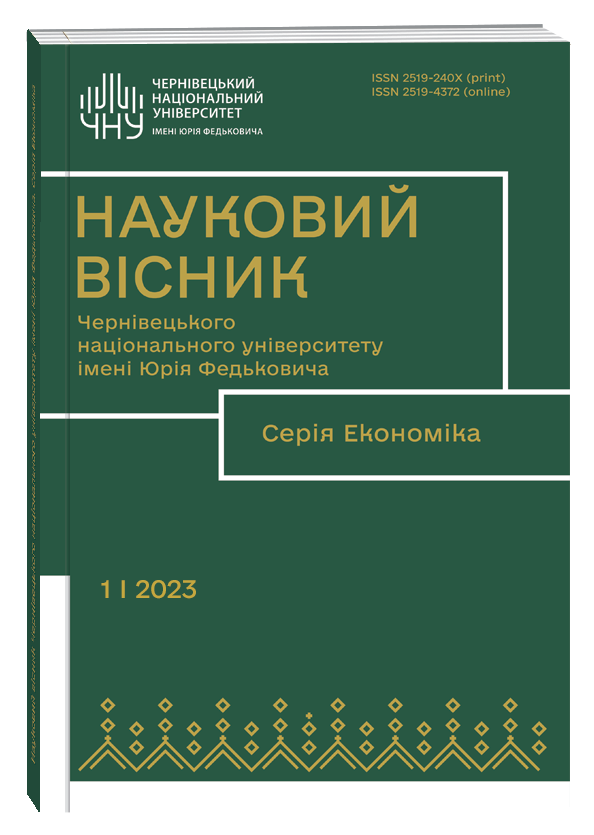PRINCIPLES OF DIGITAL MANAGEMENT IN THE AGRICULTURAL SECTOR AS A TOOL FOR IMPROVING FOOD SECURITY
DOI:
https://doi.org/10.32782/ecovis/2023-1-5Keywords:
international logistics, geopolitical turbulence, global supply chains, classification of geopolitical factors, logistical resilienceAbstract
The article reveals the problems of international logistics in the context of modern geopolitical turbulence, when military-political conflicts, sanctions regimes, trade restrictions, and geoeconomic competition fundamentally transform global supply chains. Key factors influencing international logistics are revealed: military-political conflicts, sanctions and trade restrictions, regional blocs, control over strategic transport corridors, energy and resource security, cyber and information threats, and other global challenges. The need for their systematic classification is substantiated based on signs of direct and indirect influence, scale of manifestation, duration of action, and consequences for logistics. It is determined that geopolitical factors not only create new conditions for the movement of goods but also form the strategic parameters for the development of global transport systems, determining their level of security and accessibility. The shift in focus in global logistics from a cost-minimization model to a model of ensuring resilience and security is revealed. It is substantiated that such a transformation leads to an increasing role of route diversification, the creation of backup supply chains, the formation of strategic reserves, and the development of multi-level partnership networks. The importance of digital technologies—blockchain solutions, real-time monitoring systems, and artificial intelligence—as tools for increasing the transparency, efficiency, and adaptability of logistical processes is determined. It is emphasized that modern global challenges stimulate the regionalization of logistics, the implementation of 'green' logistics, and energy-saving technologies, which strengthens the role of sustainability in strategic management. It is determined that the activities of procurement departments are turning into a key institutional basis for forming risk-oriented management strategies. In summary, the classification of geopolitical factors of influence is substantiated, their content is revealed, and the directions of transformation of international logistics are generalized. It is concluded that international logistics is transitioning to a new model of operation based on resilience, adaptability, and innovation, which ensures its ability to withstand external shocks and create new opportunities for the development of the global economy.
References
Васильців Н. М. Передумови та тенденції розвитку глобальної логістики. Вісник НУ «Львівська політехніка». 2010. № 669. С. 267–275.
Войтко С. В. Дослідження розвитку міжнародних логістичних систем в Україні та світі в умовах Індустрії 4.0. Інноваційна економіка. 2020. № 7-8. С. 14–21. DOI: https://doi.org/10.37332/2309-1533.2020.7-8.2
Гринюк Н. А., Спірідонов Д. С. Теоретичні підходи до функціонування міжнародних логістичних систем. Економіка та держава. 2021. № 12. С. 130–134. DOI: https://doi.org/10.32702/2306-6806.2021.12.130
Лебединська О. І. Особливості міжнародної логістики в умовах глобалізації. Вісник ХНАУ. Серія: Економічні науки. 2017. № 3. С. 195–201. URL: http://nbuv.gov.ua/UJRN/Vkhnau_ekon_2017_3_24
Прокопишин О. С., Трушкіна Н. В., Сербіна Т. В. Щодо організації зовнішньоекономічної логістичної діяльності аграрних підприємств в умовах війни. Вісник економічної науки України. 2022. № 1 (42). С. 209–217. DOI: https://doi.org/10.37405/1729-7206.2022.1(42).209-217
Резнік Н., Малукало О., Смігунова О. Передумови та тенденції розвитку міжнародної логістики. Herald of Khmelnytskyi National University. Economic Sciences. 2021. Вип. 298. № 5(2). С. 139–143. DOI: 10.31891/2307-5740-2021-298-5(2)-22
Трушкіна Н., Сербіна Т. Міжнародна логістика у системі зовнішньоекономічної діяльності підприємства. International Science Journal of Management, Economics & Finance. 2022. № 1(3). С. 101–114. URL: https://isg-journal.com/isjmef/article/view/54
Яременко О. Ф. Особливості логістики за умов глобалізації конкурентного середовища. Вісник Хмельницького національного університету. 2018. № 3 Том 1. С. 240–244. URL: https://journals.khnu.km.ua/vestnik/pdf/ekon/pdfbase/2018/2018_3_1/jrn/pdf/47.pdf
Vasylʹtsiv, N. M. (2010). Peredumovy ta tendentsii rozvytku hlobalʹnoi lohistyky [Prerequisites and trends in the development of global logistics]. Visnyk NU "Lʹvivsʹka politekhnika" – Bulletin of Lviv Polytechnic National University, no. 669, pp. 267–275. [in Ukrainian].
Voĭtko, S. V. (2020). Doslidzhennia rozvytku mizhnarodnykh lohistychnykh system v Ukraïni ta sviti v umovakh Industrii 4.0 [Research on the development of international logistics systems in Ukraine and the world in the context of Industry 4.0]. Innovatsiĭna ekonomika – Innovative Economy, no. 7-8, pp. 14–21. DOI: https://doi.org/10.37332/2309-1533.2020.7-8.2 [in Ukrainian].
Hryniuk, N. A., & Spiridonov, D. S. (2021). Teoretychni pidkhody do funktsionuvannia mizhnarodnykh lohistychnykh system [Theoretical approaches to the functioning of international logistics systems]. Ekonomika ta derzhava – Economy and State, no. 12, pp. 130–134. DOI: https://doi.org/10.32702/2306-6806.2021.12.130 [in Ukrainian].
Lebedynsʹka, O. I. (2017). Osoblyvosti mizhnarodnoii lohistyky v umovakh hlobalizatsii [Features of international logistics in the context of globalization]. Visnyk KhNAU. Seriia: Ekonomichni nauky – Bulletin of Kharkiv National Agrarian University. Series: Economic Sciences, no. 3, pp. 195–201. URL: http://nbuv.gov.ua/UJRN/Vkhnau_ekon_2017_3_24 [in Ukrainian].
Prokopyshyn, O. S., Trushkina, N. V., & Serbina, T. V. (2022). Shchodo orhanizatsii zovnishnʹoekonomichnoï lohistychnoi diialʹnosti ahrarnykh pidpryiemstv v umovakh viiny [On the organization of foreign economic logistics activities of agricultural enterprises in wartime]. Visnyk ekonomichnoi nauky Ukraïny – Bulletin of Economic Science of Ukraine, vol. 1, no. 42, pp. 209–217. DOI: https://doi.org/10.37405/1729-7206.2022.1(42).209-217 [in Ukrainian].
Reznik, N., Malukalo, O., & Smigunova, O. (2021). Peredumovy ta tendentsii rozvytku mizhnarodnoï lohistyky [Prerequisites and trends in the development of international logistics]. Herald of Khmelnytskyi National University. Economic Sciences, iss. 298, no. 5(2), pp. 139–143. DOI: https://doi.org/10.31891/2307-5740-2021-298-5(2)-22 [in Ukrainian].
Trushkina, N., & Serbina, T. (2022). Mizhnarodna lohistyka u systemi zovnishnʹoekonomichnoi diialʹnosti pidpryiemstva [International logistics in the system of foreign economic activity of the enterprise]. International Science Journal of Management, Economics & Finance, no. 1(3), pp. 101–114. URL: https://isg-journal.com/isjmef/article/view/54 [in Ukrainian].
Yaremenko, O. F. (2018). Osoblyvosti lohistyky za umov hlobalizatsii konkurentnoho seredovyshcha [Features of logistics in the conditions of globalization of the competitive environment]. Visnyk Khmelʹnytsʹkoho natsionalʹnoho universytetu – Herald of Khmelnytskyi National University, vol. 3, no. 1, pp. 240–244. URL: https://journals.khnu.km.ua/vestnik/pdf/ekon/pdfbase/2018/2018_3_1/jrn/pdf/47.pdf [in Ukrainian].



